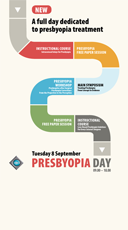Outcome and health implications of pre-anesthesia medical examination for cataract surgery
(results will display both Free Papers & Poster)
Session Details
Session Title: Presented Poster Session: News on Phaco
Session Date/Time: Tuesday 08/09/2015 | 09:30-11:00
Paper Time: 09:50
Venue: Poster Village: Pod 4
First Author: : R.Bendel USA
Co Author(s): :
Abstract Details
Purpose:
Preanesthesia Medical Examination (PAME) is a common procedure performed prior to cataract surgery. We conducted a prospective study to estimate the proportion of patients with new medical issues and unstable medical conditions discovered during ophthalmic PAME. Secondary aims were to characterize the abnormal findings, and to assess surgical delay and adverse perioperative events in relation to PAME findings.
Setting:
Mayo Clinic Foundation, Jacksonville, Florida, USA. A large, comprehensive multispecialty academic medical center.
Methods:
Patients undergoing PAME prior to ophthalmic surgery were enrolled over a period of 2 years. A review was conducted of all historical, physical examination, and test findings from the PAME.
Results:
Of 410 patients reviewed, 77 patients (19%) were reported by PAME providers to have abnormal conditions requiring further medical evaluation (95% confidence interval [CI], 16 to 23%). Careful retrospective review of PAME results identified 88 additional patients with abnormal findings for a total of 165 (40%, 95% CI, 36 to 45%) patients. Of 410 patients, the 3 primary findings were: cardiovascular (108, 26%), endocrine (17, 4%), pulmonary (17, 4%) and renal (18, 4%). Surgery was delayed due to PAME in 17 (4%) patients. Adverse events occurred in 37 patients (9%, 95% CI, 7 to 12%) within 1 month of surgery.
Conclusions:
Ophthalmic PAME frequently detects new medical issues or unstable existing conditions, which do not typically alter the conduct of perioperative procedures or outcomes. However, these conditions are relevant to long-term patient health and should be conveyed to primary care physicians for further evaluation.
Financial Interest:
NONE





